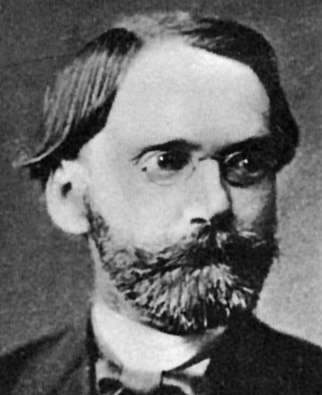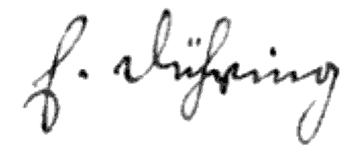| Profile | Major Works | Resources |
Eugen Karl Dühring, 1833-1921.
\

19th Century German lawyer, economist, scientist, mathematician, and philosopher - Eugen Dühring wrote on a surprising breadth of topics.
Born in Berlin, to a family of Prussian officials, Eugen Dühring trained as a lawyer. However, his career was quickly compromised when an affliction to his eyes led him to become nearly completely blind before the age of thirty. Although he gave up his legal practice, Dühring continued on an academic track, and in 1863 complete his doctorate in philosophy and economics at the University of Berlin, and was promptly appointed to remain as a teacher there. Dühring taught at Berlin until 1877, when a dispute led to his resignation.
A positivist philosopher, Dühring believed in the natural harmonies of the classes, along the lines of the American Henry C. Carey. Like Carey, Dühring was heavily influenced by Friedrich List and combined external protectionism with internal free enterprise. Dühring was a proponent of socialist-style reform.to improve the lot workers. He eschewed Social Darwinism, and saw competition as largely destructive. A confirmed opitimist, Dühring believed that man's capacity and propensity for sympathy would overcome competition, and that mankind in the future would be organized in a network of egalitarian communes.
Unfortunately, Dühring's work is overshadowed by his legacy as a promoter of virulent Anti-Semitic theories, most notorioiusly in his 1881 tract. Dühring went beyond smug racial superiority, but also promoted the idea that Jews were dangerous and socially harmful, and that Jews and Jewish culture and ideas should entirely purged from German society. Dühring went so far as to deplore Christianity for introducing Jewish "febrility" into the Aryan mind, and urging the extirpation of of that too.
Dühring's fame may ultimately rest on his being the target of the polemical 1878 tract by Friedrich Engels, Anti-Dühring Although a socialist himself, Dühring deplored the First International under the leadership of Karl Marx, and deplored the Marxist theory of class struggle and its confrontational strategy. The popularity of Dühring's works among some German socialists prompted Marx to set Engels on the task of addressing Dühring's philosophical system. Engels broke down Dühring's theory point for point, contrasting it with the Marxian theory, especially on philosophical points like dialectical materialism. As a result, Anti-Dühring emerged as a compact and convenient exposition and elaboration of Marxist philosophy itself, and became arguably the second most popular book of the Marxist canon (after the Communist Manifesto).
|
Major Works of Eugen Dühring
|
|
HET
|
|
Resources on Eugen Dühring
|
All rights reserved, Gonçalo L. Fonseca
